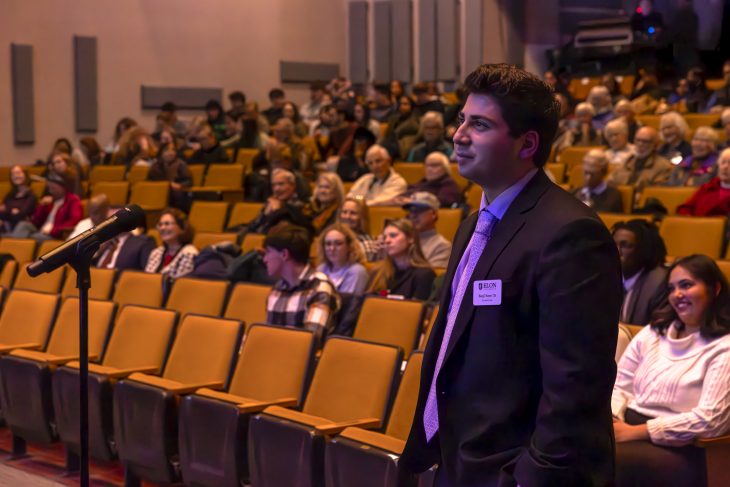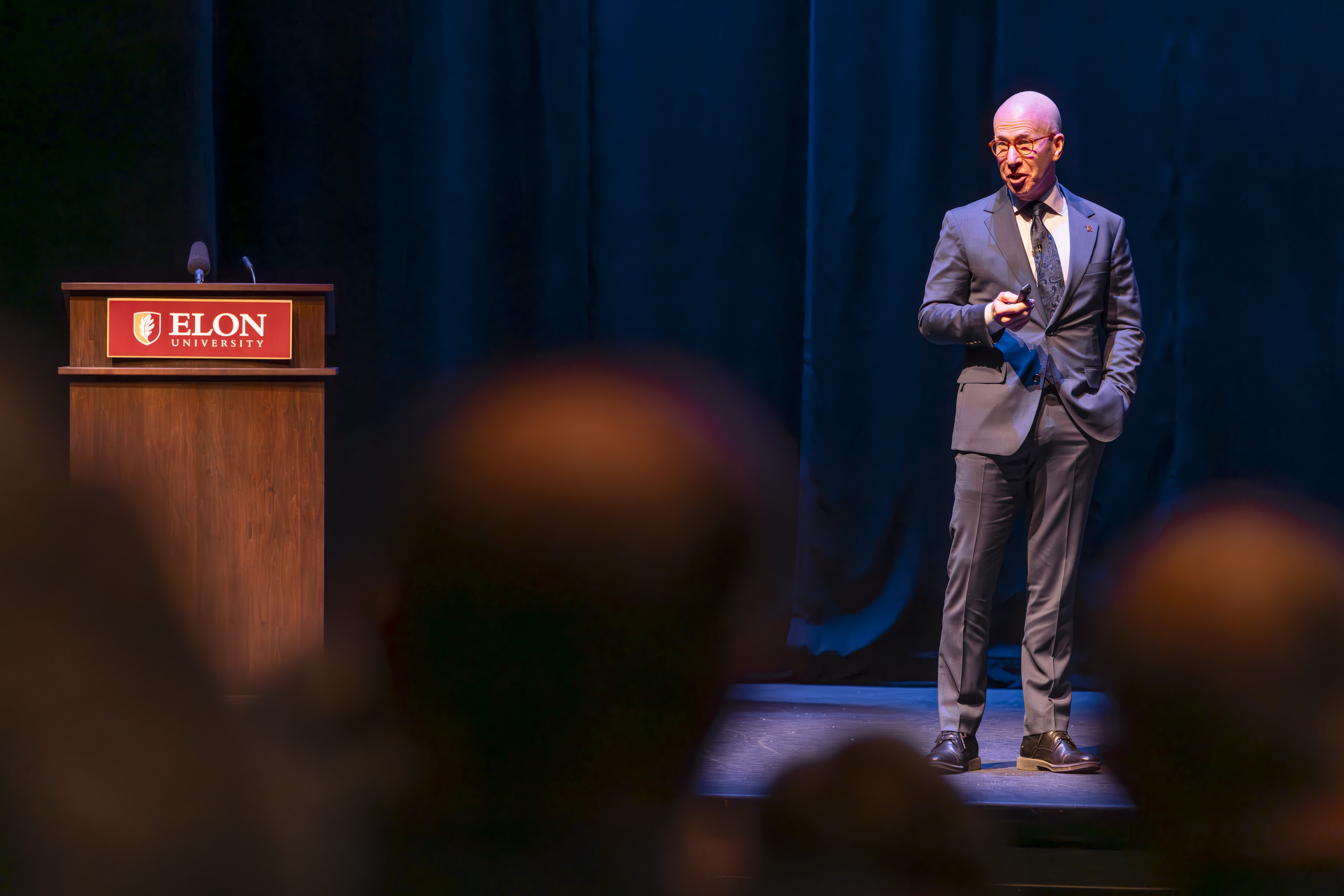Pulitzer Prize winner Jonathan Eig, author of “King: A Life,” delivered the Elon University Martin Luther King Jr. Commemorative Address and Liberal Arts Forum Lecture on Jan. 9, presenting a more comprehensive and human view of the famed civil rights leader.
In Elon University’s McCrary Theatre on Jan. 9, author and journalist Jonathan Eig reflected on the life of Martin Luther King Jr., hoping to offer a more nuanced view of the civil rights leader rather than the “comfortable image” King has become today.
“We have de-radicalized (King). We have de-fanged him. We have whitewashed his message,” said Eig. “We have forgotten that he was a human being. We have forgotten that he was a radical, that he was a man of faith. We’ve forgotten that he had fears, he had failures, and in doing so we’ve really stripped away his power to speak to us today.”
King: A Life
Eig, the Pulitzer Prize-winning author of “King: A Life,” delivered the Martin Luther King Jr. Commemorative Address and Liberal Arts Forum Lecture, part of the Elon University Speaker Series. The Liberal Arts Forum is a student organization that hosts speakers from various fields, providing the Elon community with opportunities for academic enrichment, interdisciplinary connections and stimulating conversations. Randy Williams, vice president for inclusive excellence, and Isabella Hosein ’25, president of the Liberal Arts Forum, introduced Eig on Thursday.
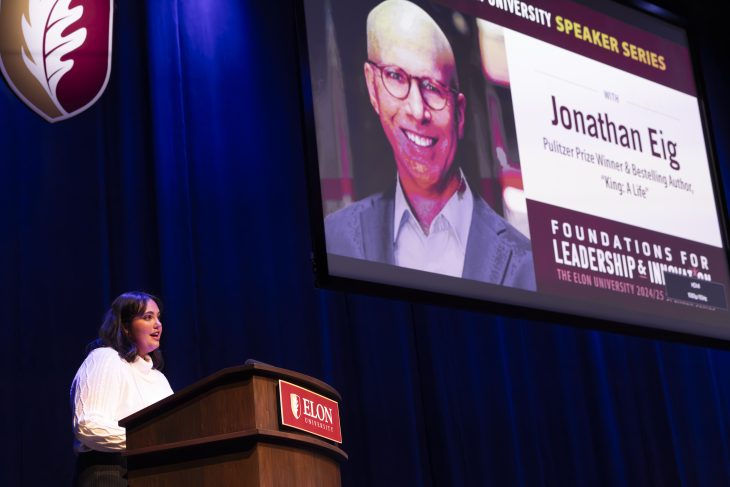
The biography took Eig six years to develop and write, including researching unopened notes from King’s archivist; tapes recorded by Coretta Scott King, Martin Luther King Jr.’s wife, as she worked on her memoir; and an unpublished autobiography of Martin Luther King Sr.
Eig also interviewed people who knew King, like his childhood friend, women he dated and people who became civil rights legends in their own right: Harry Bellefonte, Jesse Jackson, John Lewis and Andrew Young. In talking with these famous men, Eig admitted he was nervous and tried to ask questions that would make them think outside of the usual questions they answered about King over the years. Eig asked Bellefonte, a close confidant of King, what the two of them would do when they were bored.
“I would sometimes take Martin to jazz clubs, but he didn’t seem to really like it,” Bellefonte told Eig. “So sometimes we’d just sit around my apartment listening to records … we would listen to the songs of the movement, we would listen to Lead Belly; Peter, Paul and Mary; and Odetta, and Dr. King would sing along, and we’d take off our socks and shoes and sit on the rug.”
Eig then asked Bellefonte if King was a good singer, to which Bellefonte laughed and noted, “No, he was a loud singer.”
But when planning the book, Eig looked back at the Montgomery bus boycotts and one of King’s early speeches in 1955 at Holt Street Baptist Church, four days after Rosa Parks was arrested for refusing to give up her seat on a Montgomery city bus.
“And we are not wrong, we are not wrong in what we are doing. If we are wrong, the Supreme Court of this nation is wrong. If we are wrong, the Constitution of the United States is wrong. If we are wrong, God Almighty is wrong,” said King. “If we are wrong, Jesus of Nazareth was merely a utopian dreamer that never came down to earth. If we are wrong, justice is a lie. Love has no meaning.”
“I wanted to write a book that would help us understand what made a 26-year-old capable of saying those words that day and what he went through for the next 13 years of his life,” Eig said.
“The greatest crowbar”
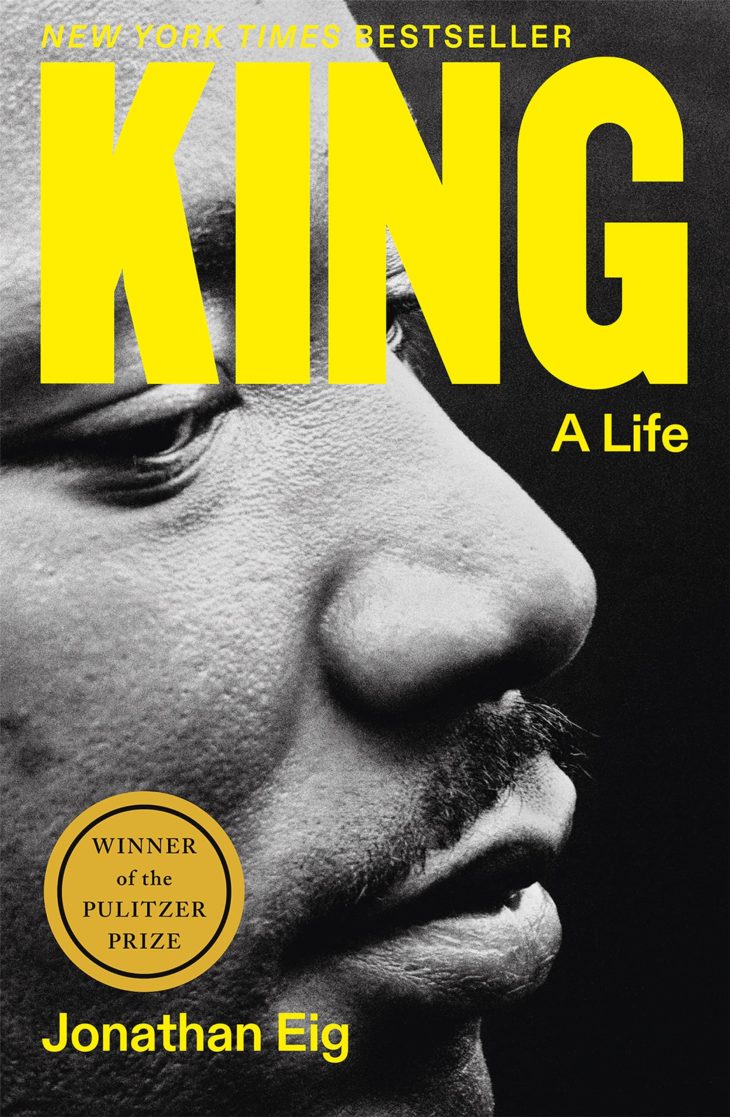
Eig’s work, which was also awarded the New York Historical Society’s 2024 Barbara and David Zalaznick Book Prize, provides a comprehensive look at King’s rise to civil rights icon, exploring not just his best moments but his flaws and character as a person, including infidelity in his marriage and plagiarizing in his professional career.
“If we demand perfection from our heroes, we will have no heroes,” said Eig during a Q&A session following the address. “I tried not to wallow in that stuff, I tried not to sensationalize. I wanted to keep it to a minimum but I felt I also had to be honest about it. I’m really pleased to say, that for the most part, people who have read the book have been moved by his courage, not distracted by his flaws.”
People told Eig that King was a sloppy eater, remarking that “utensils just slow me down,” but he had a great sense of humor and was known for remembering people’s names and being a good listener. In his professional work, King was labeled “the greatest crowbar ever produced in America,” helping to pressure lawmakers, like President John F. Kennedy, to introduce civil rights legislation, particularly following the Birmingham protest of 1963.
“This is King forcing an opening in the system, forcing justice, forcing light to get into those cracks,” said Eig.
“The most dangerous man in America”
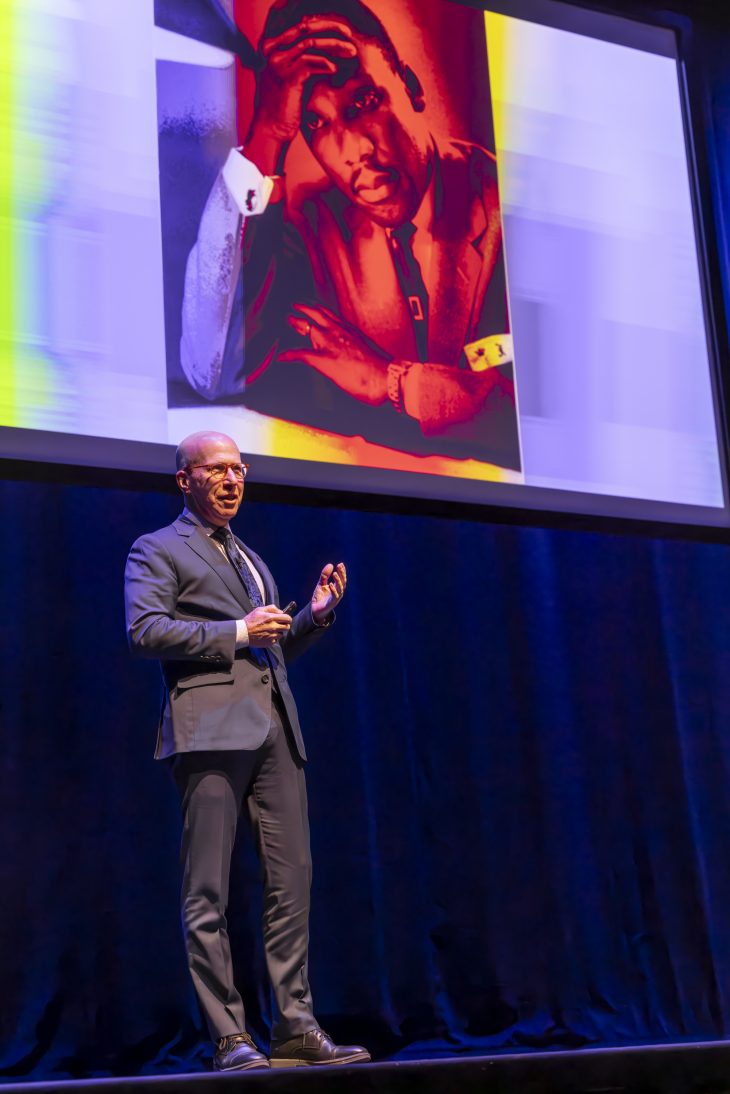
Following his 1963 “I Have a Dream” speech, the FBI gave King another label: the most dangerous man in America when it comes to race, pursuing a surveillance campaign against him.
“Let’s think about why our government, the same government that today honors him with a federal holiday, why our government, our leading law enforcement officials, would consider King a danger because he gave this speech that called for unity,” said Eig. “What’s threatening about that? What exactly does it threaten? … I think the threat was change.”
Despite these attacks from the FBI and eventual declines in his popularity among the American public, King continued his mission for equality and justice.
“King responded to this attack by doubling down on his faith, which meant not just believing in God and believing that he was doing the right thing, but speaking after what he truly believed, and that meant that he was no longer satisfied with taking the easy road and fighting just for things like voting rights and desegregation in the South,” said Eig. “He felt like he now had a responsibility to speak out on northern racism as well, on income inequality.”
“OK, I will”
This perseverance was evident up until King died in 1968 when he was assassinated at a motel in Memphis, Tennessee, at the age of 39. As he was standing on the motel balcony, his driver encouraged him to grab a jacket, to which he responded “OK, I will,” which were some of his final words.
“This is a man who wasn’t looking to become the leader of the movement at 26, wasn’t looking to give up his life for this cause, but who responded to the call because he believed in what we as a people could become and what we as a nation could become and was willing to give his life for that,” said Eig.
And Eig says America today can learn from those final words.
“When I think sometimes about where we are today and how hopeless it sometimes feels, and how it even feels as if Dr. King’s own legacy is being intentionally destroyed, that the things he helped us win are being stripped away … if Dr. King, after having been arrested 29 times, was stabbed in the chest, having been attacked by his own government, could go on and maintain hope and encourage us to never lose ultimate hope, then I think all of us can look at the challenges we face today and find a way to say, ‘OK, I will,’” Eig said.
